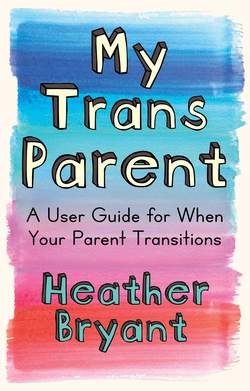Читать книгу My Trans Parent - Heather Bryant - Страница 39
На сайте Литреса книга снята с продажи.
WHAT IF NO ONE KNOWS?
Оглавление“Since virtually no one knows that I do, in fact, have a transgender parent, the only challenges I have faced thus far are internal.”
—LESLIE Q., AGE 24
At the time when my dad transitioned, “passing” was encouraged by the therapist and doctors. To qualify for surgery, she had to live full time as a woman for a whole year. She had to be a part of society in this new role. She wasn’t given the option of living in between. “Passing” raises questions about our expectations about gender.
It used to be that the goal was to “pass,” to slip by unnoticed, but more people are recognizing that all of us are more gray areas than black and white. We’re still cracking open our gender codes. There’s still more to learn for all of us, more parts of the spectrum we have yet to see.
“Passing” felt like a superpower at the time—that practically overnight, she could slide on a headband and a skirt, and disappear into this new role. It felt like magic. No one asked and no one stared. As my “aunt,” she could say things that would sound like bragging if people knew she was my dad.
“Passing,” for me, meant telling only part of the story, hiding in a way from the whole truth. To my parent, it was a comfort to slip by unnoticed, to not stand out or be put in the spotlight. To me, it was complicated by my own desire to fit in, while also wanting to tell the truth.
I became watchful of the world around me. Once, Dana and I went to a soup and sandwich place for lunch. Half of my attention went to checking the faces of the people around us to see if anyone was staring, and the other half was simply going out to lunch. I became a guard, whether I wanted to or not.
If my parent slips by unnoticed, I don’t face the direct discrimination that can come up if my parent stands out. As Noelle described it, “I didn’t have to deal with the challenge that might have been facing us had people been able to tell.” She also emphasizes that it was a choice of her parent. “Now there are people who don’t even seek to pass.” Like my parent, hers disappeared in the crowd. “That was my dad’s goal—she was really good at it—nobody could really tell.” That was the same in my family. It felt like we were succeeding, but at what?
For me, I didn’t experience bullying or ostracization from my peers, but the desire to pass and that goal to fit in built up an internal resistance to being different. It put the focus on how we looked to the outside world instead of who we were on the inside.
If people don’t know our parents are transgender, then where do we belong? I wanted to fit into the straight, cisgender world, but that didn’t always feel like the place for my family. At the same time, my family’s place in the LGBTQ+ community shifted with transition, too.
